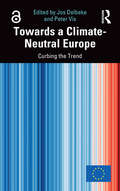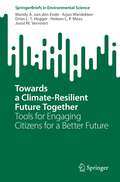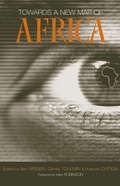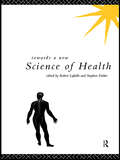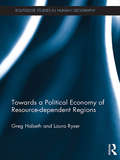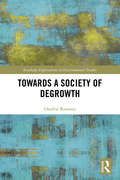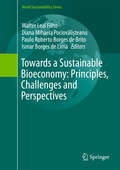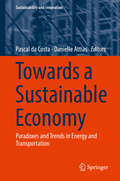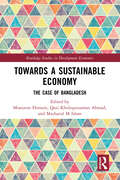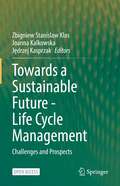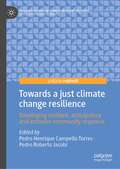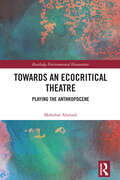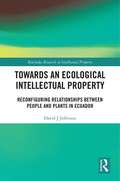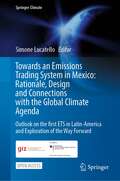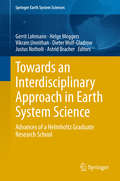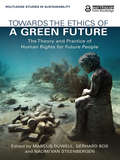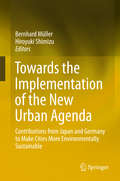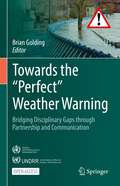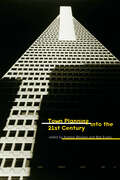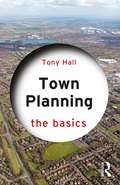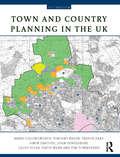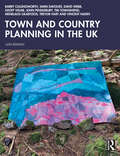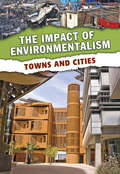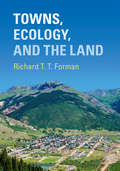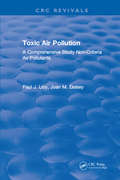- Table View
- List View
Towards a Climate-Neutral Europe: Curbing the Trend
by Jos Delbeke Peter VisThis book explains the EU’s climate policies in an accessible way, to demonstrate the step-by-step approach that has been used to develop these policies, and the ways in which they have been tested and further improved in the light of experience. The latest changes to the legislation are fully explained throughout. The chapters throughout this volume show that no single policy instrument can bring down greenhouse gas emissions. The challenge facing the EU, as for many countries that have made pledges under the Paris Agreement, is to put together a toolbox of policy instruments that is coherent, delivers emissions reductions, and is cost-effective. The book stands out by the fact it covers the EU’s emissions trading system, the energy sector and other economic sectors, including their development in the context of international climate policy. This accessible book will be of great relevance to students, scholars and policy makers alike.
Towards a Climate-Resilient Future Together: Tools for Engaging Citizens for a Better Future (SpringerBriefs in Environmental Science)
by Mandy A. van den Ende Arjan Wardekker Dries L.T. Hegger Heleen L.P. Mees Joost M. VervoortAlthough many local authorities underline the important role of citizens in climate adaptation, many experience difficulties with organizing citizen participation in a way that is meaningful to both citizens and policymakers. Climate change is for many simply not a top priority. Besides, the future is often rather abstract to people, citizens in particular. We argue that practical tools are needed to help citizens structure the process of thinking about and designing the future of their living environment under the impacts of climate change. The toolbox Towards a climate-resilient future together offers practical foresight methods and tools for organizing citizen participation in the process of building climate-resilient futures. It provides an overview of the state the art of and hands-on guidance for executing participatory foresight methods and showcases some of the lessons learned from several international research programs on citizen engagement. In doing so, the toolbox can assist practitioners, students and academics concerned with the question of how local communities in urban and rural areas could adapt to climate change impacts and become more resilient in the future. It is suitable for readers without any experience in citizen participation and/or foresight, while more experienced readers will find innovative combinations of methods and tools that are unique within the field of citizen participation and foresight..
Towards a New Map of Africa
by Ben Wisner Camilla Toulmin'The big, era-defining questions and, at last, the subtle, tenable answers, teased out without clich or compromise. A vital volume at a critical moment.' Dr Augustus Casely-Hayford, Director, Africa '05 'This book dispels the myth of a uniformly hopeless, hungry continent. It shows just how extraordinarily diverse Africa is and how much it has changed in the last 20 years.Full of fresh thinking on problems that face Africa and new African approaches to development.' Richard Dowden, Director, Royal African Society This ground-breaking book, with a foreword by former President of Ireland (199-997) and UN Human Rights Commissioner (1997 2002) Mary Robinson, uniquely distils the complex issues surrounding Africa at the beginning of the 21st century. African and Western scholars provide a fascinating 'map' for the reader to navigate between issues such as urban and rural livelihoods, the potential of fresh water fishing, health, the HIV/AIDS crisis, conflict and efforts at peacemaking. Also included are critical assessments of Africa's role in the global economy, the growth of regional economic cooperation within Africa, the influence of ethnicity on the continent's politics, the evolution of its political institutions, and the impact of Africa's legal systems on its development. A substantial introductory essay by the editors measures the distance Africa has travelled and the lessons it has learned since Africa in Crisis, the classic Earthscan book, was published in 1985. Ben Wisner is visiting research fellow at DESTIN, London School of Economics and at Benfield Hazard Research Centre, University College London, and visiting professor of environmental studies, Oberlin College, USA. Camilla Toulmin is Director of the International Institute for Environment and Development. Rutendo Chitiga is a freelance writer and editor, and has a postgraduate degree in environment and development.
Towards a New Science of Health
by Stephen Fulder Robert LafailleThe foundations of health sciences need rethinking. The mechanistic biomedical model, apparently so successful in the past, is now criticised for failing to explain what health is and how it can be preserved. The world's major health problems no longer seem so controllable. A new science of health is needed, a radical spirit of inquiry which draws on a broad knowledge base and a variety of approaches, a science which does not balk at reconceptualising health and building on innovative research. Towards a New Science of Health provides a radical alternative to current biomedical thinking. Presenting an overview of all major paradigms in the health sciences, their historical development, socio-cultural background and value, the book provides a framework for innovative thinking in health. Drawing on a range of disciplinary perspectives and focussing on a variety of approaches - systems theory, human experience and biography, the healing process and social relations - the authors aim to bridge the gap between personal experience and scientific knowledge.
Towards a Political Economy of Resource-dependent Regions (Routledge Studies in Human Geography)
by Laura Ryser Greg HalsethThis book advances our understanding of resource-dependent regions in developed economies in the 21st Century. It explores how rural and small town places are working to find success in a new economy marked by demographic, economic, social, cultural, political, and environmental change. How are we to understand the changes and transformations working through communities and economies? Where are the trajectories of change leading these resource-dependent places and regions? Drawing upon examples from Canada, USA, UK, Australia, New Zealand, and the Nordic countries, these and other questions are explored and addressed by constructing a critical political economy framework of resource hinterland transition. Towards a Political Economy of Resource Dependent Regions is a key resource for students and researchers in geography, rural and industrial sociology, economics, environmental studies, political science, regional studies, and planning, as well as policy-makers, those in industry and the private sector, and local and regional development practitioners.
Towards a Society of Degrowth (Routledge Explorations in Environmental Studies)
by Onofrio RomanoThis book explores the concept of degrowth, beginning from a basic assumption, not of resource depletion, as is common in most literature in the field, but rather from a state of abundance, arguing that there is a vast amount of energy on the planet waiting to be utilized by all its inhabitants. Adopting a sociological approach, Onofrio Romano argues that the growth momentum is not simply a broadly shared “value,” but the physiological outcome of a specific institutional frame. The problem is that in its mainstream formulation the degrowth alternative shares with the growth-led regime some basic anthropological, political, and institutional pillars. In order to build a real alternative, Romano suggests reviewing degrowth in the light of the dépense notion by Georges Bataille. According to Bataille, our societies have no problem with acknowledging scarcity, but with dealing with the surplus energy that calls us to act for a qualified life. So, in order to erase the growth obsession, we have to ward off the “servile” dimension, i.e., the utilitarian activities needed for the mere reproduction of life, to regain sovereignty, as reflected in the de-thinking subject. Innovative and provocative, Towards a Society of Degrowth will be of great interest to students and scholars of degrowth, sociology, social anthropology, political ecology, and ecological economics.
Towards a Sustainable Bioeconomy: Principles, Challenges and Perspectives (World Sustainability Series)
by Walter Leal Filho Ismar Borges de Lima Diana Mihaela Pociovălișteanu Paulo Roberto Borges de BritoThis book gathers contributions from scientists and industry representatives on achieving a sustainable bioeconomy. It also covers the social sciences, economics, business, education and the environmental sciences. There is an urgent need to optimise and maximise the use of biological resources, so that primary production and processing systems can generate more food, fibre and other bio-based products with less environmental impacts and lower greenhouse gas emissions. In other words, we need a "sustainable bioeconomy" - a term that encompasses the sustainable production of renewable resources from land, fisheries and aquaculture environments and their conversion into food, feed, fibre bio-based products and bio-energy, as well as related public goods. Despite the relevance of achieving a sustainable bioeconomy, there are very few publications in this field. Addressing that gap, this book illustrates how biological resources and ecosystems could be used in a more sustainable, efficient and integrated manner - in other words, how the principles of sustainable bioeconomy can be implemented in practice. Given its interdisciplinary nature, the field of sustainable bioeconomy offers a unique opportunity to address complex and interconnected challenges, while also promoting economic growth. It helps countries and societies to make a transition and to use resources more efficiently, and shows how to rely less on biological resources to satisfy industry demands and consumer needs. The papers are innovative, cross-cutting and include many practice-based lessons learned, some of which are reproducible elsewhere. In closing, the book, prepared by the Inter-University Sustainable Development Research Programme (IUSDRP) and the World Sustainable Development Research and Transfer Centre (WSD-RTC), reiterates the need to promote a sustainable bioeconomy today.
Towards a Sustainable Economy: Paradoxes and Trends in Energy and Transportation (Sustainability and Innovation)
by Danielle Attias Pascal Da CostaThis book provides an interdisciplinary account of how technological advances – mainly in the domains of energy and transportation – contribute to the transformation towards a more sustainable economic system. Drawing on methods from engineering, the management sciences and economics, which it combines in the framework of a systems sciences approach, the book presents qualitative and quantitative studies on government regulation, resources management and firms' strategy. Topics covered include the state-market dilemma of government CO2 emission targets, implications of the electrification of the economy, incentives and coercion in government transport policies, and innovations in the electric vehicle industry.
Towards a Sustainable Economy: The Case of Bangladesh (Routledge Studies in Development Economics)
by Moazzem Hossain Qazi Kholiquzzaman Ahmad Mazharul M IslamThe Sustainable Development Goals (SDGs) were introduced by the United Nations (UN) for all member nations with a total of 17 goals and 169 targets to be achieved between 2016 and 2030. The recent pandemic has presented more challenges to achieving the UN’s SDGs. This book examines Bangladesh’s ascendancy in socio-economic terms and the prospects of Bangladesh overcoming the challenges to become a higher-middle-income nation by 2030. This book traces the transformation of Bangladesh from 1996 through 2020 and examines various factors contributing to its success from rural economy, external support, manufacturing, and structural transformation to energy consumption. This book also looks at the challenges and opportunities for Bangladesh as the Fourth Industrial Revolution unfolds and as climate change, to which Bangladesh is highly vulnerable, escalates. This book will be a useful reference document for those who are interested in gaining more insights into inclusive growth and sustainable development from the case study of Bangladesh.
Towards a Sustainable Future - Life Cycle Management: Challenges and Prospects
by Zbigniew Stanisław Kłos Joanna Kałkowska Jędrzej KasprzakThis open access book includes a selection of contributions from the Life Cycle Management 2019 Conference (LCM) held in Poznań, Poland, and presents different examples of scientific and practical contributions, showing an incorporation of life cycle approach into the decision processes on strategic and operational level. Special attention is drawn to applications of LCM to target, organize, analyze and manage product-related information and activities towards continuous improvement, along the different products life cycle. The selection of case studies presents LCM as a business management approach that can be used by all types of businesses and organizations in order to improve their sustainability performance. This book provides a cross-sectoral, current picture of LCM issues. The structure of the book is based on five-theme lines. The themes represent different objects that are focused on sustainability and LCM practices mainly related to: products, technologies, organizations, markets and policy issues as well as methodological solutions. The book brings together presentations from the world of science and the world of enterprises as well as institutions supporting economic development.
Towards a just climate change resilience: Developing resilient, anticipatory and inclusive community response (Palgrave Studies in Climate Resilient Societies)
by Pedro Henrique Campello Torres Pedro Roberto JacobiThis book provides an accessible overview of how efforts to combat climate change and social inequalities should be tackled simultaneously. In the context of the climate emergency, the impacts of extreme events can already be felt around the world. The book centres on five case studies from the Global South, Latin America, Pacific Islands, Africa, and Asia with each one focused on climate justice, resilience, and community responses towards a just transition. The book will be an invaluable reference for advanced undergraduates and postgraduate students, researchers, policymakers, and practitioners in environmental studies, urban planning, geography, social science, international development, and disciplines that focus on the social dimensions of climate change.
Towards an Ecocritical Theatre: Playing the Anthropocene (Routledge Environmental Humanities)
by Mohebat AhmadiTowards an Ecocritical Theatre investigates contemporary theatre through the lens of Anthropocene-oriented ecocriticism. It assesses how Anthropocene thinking engages different modes of theatrical representation, as well as how the theatrical apparatus can rise to the representational challenges of changing interactions between humans and the nonhuman world. To explore these problems, the book investigates international Anglophone plays and performances by Caryl Churchill, Stephen Sewell, Andrew Bovell, E.M. Lewis, Chantal Bilodeau, Jordan Hall, and Miwa Matreyek, who have taken significant steps towards re-orienting theatre from its traditional focus on humans to an ecocritical attention to nonhumans and the environment in the Anthropocene. Their theatrical works show how an engagement with the problem of scale disrupts the humanist bias of theatre, provoking new modes of theatrical inquiry that envision a scale beyond the human and realign our ecological culture, art, and intimacy with geological time. Moreover, the plays and performances studied here, through their liveness, immediacy, physicality, and communality, examine such scalar shifts via the problem of agency in order to give expression to the stories of nonhuman actants. These theatrical works provoke reflections on the flourishing of multispecies responsibilities and sensitivities in aesthetic and ethical terms, providing a platform for research in the environmental humanities through imaginative conversations on the world’s iterative performativity in which all bodies, human and nonhuman, are cast horizontally as agential forces on the theatrical world stage. This book will be of great interest to students and scholars of theatre studies, environmental humanities, and ecocritical studies.
Towards an Ecological Intellectual Property: Reconfiguring Relationships Between People and Plants in Ecuador (Routledge Research in Intellectual Property #1)
by David J JeffersonThis book focuses on analysing how legal systems set the terms for interactions between human beings and plants. The story that the book recounts is one of experimental lawmaking in Ecuador, a country where over the past decade, governmental officials and civil society advocates have attempted to reconfigure how human individuals and institutions relate to nature, by following an "eco-centric" approach to lawmaking. In doing so, Ecuadorian legislators, administrators, and judges have taken seriously the ontologies of non-human entities, including plants, through a process that has required the continuous navigation of tensions with certain "logics" that pervade conventional legal regimes. The book endeavours to disrupt these conventional assumptions and approaches to lawmaking by taking seriously alternative strategies to reconstitute interactions between people and plants. In doing so, the book argues in favour of an "ecological turn" in laws that govern vegetal life. The analysis is based on a close examination of the experiences that lawmakers in Ecuador have had when experimenting with innovative approaches to re-form relationships between human and non-human beings. Concretely, these experiments have yielded constitutional, legislative, and regulatory changes that inform the inquiry of how intellectual property and plant genetic resources laws – both in Ecuador and worldwide – could become more "ecological" in nature. The argument that the book develops is based on extensive ethnographic fieldwork and empirical research in Ecuador, complemented by archival and doctrinal legal analysis. The contents of the book will be of interest to an academic audience of legal scholars and postgraduate students in law, in addition to scholars and students in the fields of anthropology, sociology, socio-legal studies, and science and technology studies.
Towards an Emissions Trading System in Mexico: Outlook on the first ETS in Latin-America and Exploration of the Way Forward (Springer Climate)
by Simone LucatelloThis Open Access book provides detailed information about the incoming Mexican Emissions Trading System, including an analysis on why the system was implemented, how the system was designed, how it operates, how it could work, and how it could be strengthened by 2023 when it will be formally launched. This document is aimed at those who want to understand how an ETS can operate in an emerging economy. Although it has been written for experts and non-experts, this book does not provide the underlying theory of market-based instruments and emissions trading systems in general. The book can be read from start to finish, but can also be used as a reference for specific components of regional ETSs. The book draws upon a meticulous study of background documents and fieldwork from different authors to tell the story of how a Mexican ETS, the first of its kind in Latin America, can be set in the country. The emissions trading system cover many greenhouse gas emissions and has been hailed as one of the cornerstones of the Mexican climate policy. The book also examines and explains how the ETS is designed and implemented.
Towards an Interdisciplinary Approach in Earth System Science
by Vikram Unnithan Dieter Wolf-Gladrow Justus Notholt Gerrit Lohmann Helge Meggers Astrid BracherThis book describes the latest advances at the Helmholtz "Earth System Science Research School" where scientists from the Alfred Wegener Institute in Bremerhaven, the University of Bremen, and the Jacobs University are involved in research. One of the greatest challenges is understanding ongoing environmental changes. The longer the time scale the more components of the Earth system are involved, e. g. interannual and decadal variations are related to the coupled atmosphere-ocean-sea ice system, whereas longer variations like glacial-interglacial or Cenozoic transitions involve the carbon cycle, ice sheets and gateways. In order to get deep insights into Earth system science, observations, remote sensing, past environmental data, as well as modeling need to be integrated. These different approaches are traditionally taught in separated disciplines at bachelor and master levels. It is, therefore, necessary to bring these disciplines together in PhD programs.
Towards the Ethics of a Green Future: The Theory and Practice of Human Rights for Future People (Routledge Studies in Sustainability)
by Gerhard Bos Marcus Düwell Naomi Van SteenbergenWhat are our obligations towards future generations who stand to be harmed by the impact of today’s environmental crises? This book explores ecological sustainability as a human rights issue and examines what our long-term responsibilities might be. This interdisciplinary collection of chapters provides a basis for understanding the debates on the provision of sustainability for future generations from a diverse set of theoretical standpoints. Covering a broad range of perspectives such as risk and uncertainty, legal implementation, representation, motivation and economics, Towards the Ethics of a Green Future sets out the key questions involved in this complex ethical issue. The contributors bring theoretical discussions to life through the use of case studies and real-world examples. The book also includes clear and tangible recommendations for policymakers on how to put the suggestions proposed within the book into practice. This book will be of great interest to all researchers and students concerned with issues of sustainability and human rights, as well as scholars of environmental politics, law and ethics more generally.
Towards the Implementation of the New Urban Agenda
by Hiroyuki Shimizu Bernhard MüllerThis book looks at the New Urban Agenda and prospects of its implementation. In 2016, the New Urban Agenda was endorsed by the General Assembly of the United Nations after having been adopted by the United Nations Conference on Housing and Sustainable Urban Development (Habi-tat III) in Quito, Ecuador. Together with the Sustainable Development Goals, it provides a compre-hensive and ambitious roadmap for global debate and action related to sustainable urbanisation during the coming decades. As mature economies and ageing societies, Japan and Germany can make considerable contributions to the implementation of the New Urban Agenda. Both countries share a number of similar challenges for environmentally sustainable and resilient urban develop-ment under conditions of social change. Furthermore, they have vast experience in actively pro-moting urban transformation towards a more sustainable urban future. At the same time the au-thors are making a contribution towards implementing the New Urban Agenda. Other countries may build up on the experience provided and the 20 examples described in this book. The work is based on a longstanding cooperation between the Graduate School of Environmental Studies of the Nagoya University (Japan), the Leibniz Institute of Ecological Urban and Regional Development (Germany) and the Technische Universit#65533;t Dresden (Germany).
Towards the “Perfect” Weather Warning: Bridging Disciplinary Gaps through Partnership and Communication
by Brian GoldingThis book is about making weather warnings more effective in saving lives, property, infrastructure and livelihoods, but the underlying theme of the book is partnership. The book represents the warning process as a pathway linking observations to weather forecasts to hazard forecasts to socio-economic impact forecasts to warning messages to the protective decision, via a set of five bridges that cross the divides between the relevant organisations and areas of expertise. Each bridge represents the communication, translation and interpretation of information as it passes from one area of expertise to another and ultimately to the decision maker, who may be a professional or a member of the public. The authors explore the partnerships upon which each bridge is built, assess the expertise and skills that each partner brings and the challenges of communication between them, and discuss the structures and methods of working that build effective partnerships. The book is ordered according to the “first mile” paradigm in which the decision maker comes first, and then the production chain through the warning and forecast to the observations is considered second. This approach emphasizes the importance of co-design and co-production throughout the warning process. The book is targeted at professionals and trainee professionals with a role in the warning chain, i.e. in weather services, emergency management agencies, disaster risk reduction agencies, risk management sections of infrastructure agencies. This is an open access book.
Town Planning into the 21st Century
by Bob Evans Andrew BlowersProvides a series of insights into the planning process, introduces the key issues currently facing planning and offers prescriptions for the changes required as we move into the next millenium. Leading experts outline the changing context for land use and environmental policy in Britain and explain why the existing processes and profession of town planning are likely to be unable to provide satisfactory policy responses in the future. Key themes debated include: * widening the remit of traditional town planning * giving land and buildings a community value * acting for people rather than simply for the market * promoting an equalization of environmental conditions and discouragement of motorization * the need to anticipate long term global trends at the local and national level. Contributors: Andrew Blowers, Bob Colenutt, Richard Cowell, Bob Evans, Cliff Hague, Peter Hall, Susan Owens, Eric Reade, Yvonne Rydin.
Town Planning: The Basics (The Basics)
by Tony HallThe planning of urban and rural areas requires thinking about where people will live, work, play, study, shop and how they will get about the place, and to devise strategies for long time periods. Town Planning: The Basics provides a general introduction to the components of urban areas, including housing, transportation and infrastructure, and health and environment, showing how appropriate policies can be developed. Explaining planning activity at different scales of operation, this book distinguishes between the "big stuff", the grand strategy for providing homes, jobs and infrastructure; the "medium stuff", the design and location of development; and the "small stuff" affecting mainly small sites and individual households. Planning as an activity is part of a complex web stretching way beyond the planning office, and this book provides an overview of the many components needed to create a successful town. It is invaluable to anyone with an interest in planning, from students learning about the subject for the first time to graduates thinking about embarking on a career in planning, to local councillors on planning committees and community boards.
Town and Country Planning in the UK
by David Webb Barry Cullingworth Geoff Vigar John Pendlebury Simin Davoudi Tim Townshend Trevor Hart Vincent NadinTown and country planning has never been more important to the UK, nor more prominent in national debate. Planning generates great controversy: whether it's spending £80m and four years' inquiry into Heathrow's Terminal 5, or the 200 proposed wind turbines in the Shetland Isles. On a smaller scale telecoms masts, take-aways, house extensions, and even fences are often the cause of local conflict. Town and Country Planning in the UK has been extensively revised by a new author group. This 15th Edition incorporates the major changes to planning introduced by the coalition government elected in 2010, particularly through the National Planning Policy Framework and associated practice guidance and the Localism Act. It provides a critical discussion of the systems of planning, the procedures for managing development and land use change, and the mechanisms for implementing policy and proposals. It reviews current policy for sustainable development and the associated economic, social and environmental themes relevant to planning in both urban and rural contexts. Contemporary arrangements are explained with reference to their historical development, the influence of the European Union, the roles of central and local government, and developing social and economic demands for land use change. Detailed consideration is given to * the nature of planning and its historical evolution * the role of the EU, central, regional and local government * mechanisms for developing policy, and managing these changes * policies for guiding and delivering housing and economic development * sustainable development principles for planning, including pollution control * the importance of design in planning * conserving the heritage * community engagement in planning The many recent changes to the system are explained in detail - the new national planning policy framework; the impact of the loss of the regional tier in planning and of the insertion of neighbourhood level planning; the transition from development control to development management; the continued and growing importance of environmental matters in planning; community engagement; partnership working; changes to planning gain and the introduction of the Community Infrastructure Levy; and new initiatives across a number of other themes. Notes on further reading are provided and at the end of the book there is an extensive bibliography, maintaining its reputation as the 'bible' of British planning.
Town and Country Planning in the UK
by Barry Cullingworth Simin Davoudi David Webb Geoff Vigar John Pendlebury Tim Townshend Menelaos Gkartzios Trevor Hart Vincent NadinTown and Country Planning in the UK provides one of the most authoritative and comprehensive accounts of British planning history, institutions, legislation, policies, processes and practices. This 16th edition has been substantially revised and re-organised to provide an up-to-date overview of the planning systems in the four nations of the UK, supported by analyses, interpretations, illustrations and examples from planning practice.The new edition features: details of the legislative and policy changes since 2015 and discussion of their implications, including the early stages of the Levelling Up and Regeneration Act, 2023 discussion of environmental policies and programmes and the impact of Brexit on environmental regulatory landscape in Britain changes to climate change and resilience policies, notably the government’s ‘Net Zero’ agenda and their implications for planning updates to the substantive issues in plan-making, especially the responses to the shortage of affordable housing and the development of major infrastructure changes to the processes involved in plan-making and development management an expanded and revised chapter on design to include the growing significance of public health in the built environment major revisions to the chapter on rural planning revisions of the text on planning theory especially in relation to management of conflicts over the use and development of land extended discussion of politics, professionalism and participation in planning The 16th edition of Town and Country Planning in the UK is an ideal starting point for those who are studying or working in the planning field, and for other professionals who need to locate their work in the planning context.
Towns and Cities (The Impact of Environmentalism)
by Richard SpilsburyWe are all aware of the importance of the environment - it's in the news, it affects our behavior and the decisions we make every day. But what actual impact has environmental thinking had on the world around us? This thought-provoking book looks at the way changing ideas about the environment and sustainability have changed the way our towns and cities are designed, and will do so in the future.
Towns, Ecology, and the Land
by Richard T. FormanTowns and villages are sometimes viewed as minor, even quaint, spots, whereas this book boldly reconceptualizes these places as important dynamic environmental 'hotspots'. Multitudes of towns and villages with nearly half the world's population characterize perhaps half the global land surface. The book's pages feature ecological patterns, processes, and change, as well as human dimensions, both within towns and in strong connections and effects on surrounding agricultural land, forest land, and arid land. Towns, small to large, and villages are examined with spatial and cultural lenses. Ecological dimensions - water, soil and air systems, together with habitats, plants, wildlife and biodiversity - are highlighted. A concluding section presents concepts for making better towns and better land. From a pioneer in both landscape ecology and urban ecology, this highly international town ecology book opens an important frontier for researchers, students, professors, and professionals including environmental, town, and conservation planners.
Toxic Air Pollution: A Comprehensive Study Non-Criteria Air Pollutants
by Paul J. LioyThe difficulties with addressing toxic air pollutants are the cheer number of compounds present in the atmosphere and their sources. The purpose of this book is to develop an approach to understanding toxic air pollutants through synthesis of the scientific results obtained in the Airbourne Toxic Element and Organic Substance (ATEOS) project.
